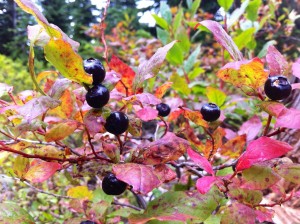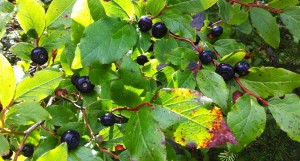 Fly fishermen like to joke about PhD trout and poindexter anglers crawling the banks spouting Latin. On first blush it may seem pretentious to be holding a trout rod in one hand and a magnifying glass in the other, while reeling off the taxonomic names of various species of Baetis and Pteronarcys. But the truth is, the fly fisherman who has an understanding of entomology has a cast up on the one who doesn’t.
Fly fishermen like to joke about PhD trout and poindexter anglers crawling the banks spouting Latin. On first blush it may seem pretentious to be holding a trout rod in one hand and a magnifying glass in the other, while reeling off the taxonomic names of various species of Baetis and Pteronarcys. But the truth is, the fly fisherman who has an understanding of entomology has a cast up on the one who doesn’t.
And so it is with huckleberries. In the Pacific Northwest there are at least a dozen species of Vaccinium, and it pays to recognize them all. There are early fruiting huckleberries (the red huckleberry, Vaccinium parvifolium) and late fruiting huckleberries (evergreen huckleberry, Vaccinium ovatum); there are tart, bright blue huckleberries that make good jam (Vaccinium ovalifolium) and nearly black huckleberries (Vaccinium membranaceum) that taste great right off the vine. There’s a huckleberry that colonizes wetter habitats (Vaccinium deliciosum) and one that can be found high in the mountains (Vaccinium caespitosum). Read this post for more tips on huckleberrying.
The other day I visited my patch of Vaccinium membranceum. This is the main species picked and sold commercially. It’s big, which makes for faster picking, and sweet. It goes by various common names including thin-leaf huckleberry, globe huckleberry, and mountain black. This is a decent year for V. membranaceum and I would encourage my readers in the Greater Pacific Northwest to search it out. Right now! It’s common in the mountains of Washington, Oregon, Idaho, western Montana, and British Columbia, with more localized populations south to California and east to the Upper Great Lakes.
We freeze as many huckleberries as we can pick, and eat them year-round. As I say in Fat of the Land, huckleberries are a baker’s wet dream. The balance between sweet and tart is ideal for pastries, and they make the best pies, cobblers, crisps, and tarts.
But we’re not the only members of Mammalia with a sweet tooth for Vaccinium and its allies. Ursus americanus and Ursus arctos horribilis are fans, too, so be prepared to share!

